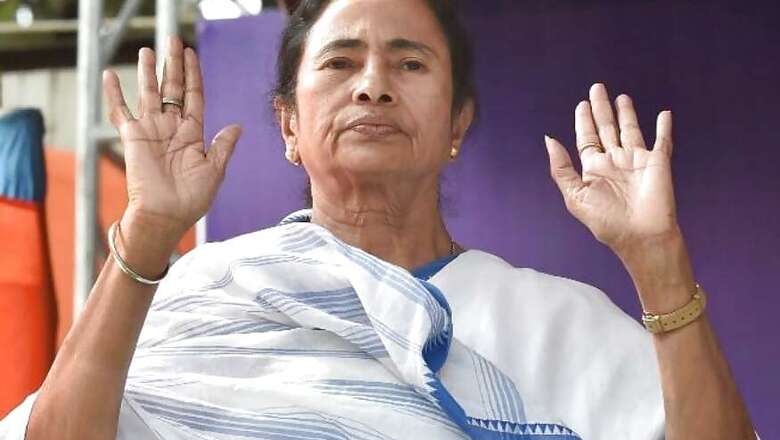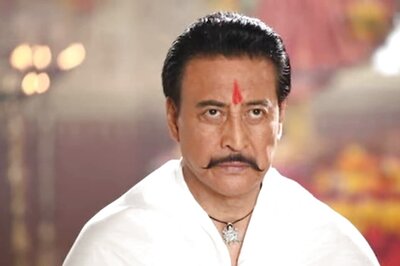
views
Kolkata: Determined to fight the BJP, which made significant inroads in West Bengal after the Lok Sabha elections in May, Mamata Banerjee has made a mindful change in her strategy in dealing with the saffron party.
There is a sea change in which the chief minister is handling the jibes made by BJP ministers. Consider this: When Prime Minister Narendra Modi took oath for the second time in May, Banerjee made headlines for confronting BJP supporters chanting ‘Jai Shri Ram’ slogans in front of her convoy in Kakinara. A little over a month later, her tone has changed from being defensive to sticking to an administrative narrative.
Banerjee now speaks less often than before on issues and appears to be choosing her words carefully. There is no longer BJP or Modi bashing, instead there is an attempt to clean up the system within the party ranks, be it at the administrative level or at the party level.
The ‘cut money’ allegations in June backfired for the ruling party when it was reported that TMC partymen across Bengal had taken money from the government schemes and not utilised it for the welfare of people. There were violent protests by angry people across the state and BJP found the perfect opportunity to lash out at the TMC once again.
But the allegations did not dampen the spirit of Banerjee, who recently launched ‘Didikebolo’ initiative for the masses to reach out to her with their grievances. Apart from the website www.didikebolo.com, there is also a phone number (9137091370) people can call on. The aim is to address the complaints by finding out the main issues that people are disgruntled with and what the government can do to bridge the gap between the state government and the people who voted for the ruling party.
What has changed for Banerje’s party Trinmool Congress is roping in political strategist Prashant Kishor, who helped spin the wheel of victory for Modi in the 2014 Lok Sabha elections. Kishor also helped YSR Congress party chief, YS Jagan Mohan Reddy, oust former chief minister Chandrababu Naidu in the recently concluded Assembly elections in Andhra Pradesh.
The TMC went down from 34 to 22 seats in the general elections, while the BJP went up from 2 to 18 seats in the state. The TMC’s vote share was 43.3 per cent, with BJP not far behind with a vote share of 40.3 per cent. These statistics have changed the political fortunes for the BJP in Mamata’s Bengal and the saffron party is more than hopeful of conquering the corridors of power in the 2021 Assembly elections.
Ending the world’s longest serving coalition rule of Left parties, after 34 years of being in power, has been Banerjee’s biggest achievement. A mascot of change, she on the chief minister’s chair in May 2011, ushering in hopes of a new Bengal, one which lakhs of citizens were desperate for. Eight years later, the TMC administration is threatened by the BJP which has taken over the opposition space in the State Assembly. The TMC went from being confident to being overconfident, resulting in losing out considerably on their vote bank in the Lok Sabha polls.
But Kishor’s new diktats for Banerjee seem to have changed the TMC’s old pattern of countering the BJP at every step. The TMC chief and her partymen are now working towards constructive development to fight the saffron party politically. Depolitisation of the governance post the Lok Sabha elections is the key and the focus now is to reach out to the masses and let the ruling party’s work speak for itself.
While announcing ‘Didi ke bolo’ initiative after the administrative meeting with her MLAs on Monday, Mamata also launched a 100-day outreach programme as part of which 1,000 TMC cadres will visit the villages to listen to and address people’s grievances.
Banerjee is a mass leader who has remained connected with the people over decades. The TMC believes that people’s anger is more towards the partymen and not so much towards the party supremo herself. The party wants to take corrective measures to work on constructive welfare for the people at the grassroot level and urban pockets, as some have lost faith in the ‘Ma Mati Manush’ ideology.
Sensing disgruntlement of a section of people before polls, the BJP stepped in with promises of renewing hope lost by many, of Bengal’s future under the TMC. Religious politics also crept into the state with the BJP telling people that only it could counter minority appeasement that Banrjeee has been accused of.
But Banerjee no longer chooses to give a rebuttal to BJP’s allegations. The TMC chief’s message is clear: criticise us if you have to, as long as you are talking about the work we are doing. Shunning the VIP culture and moving beyond election mode to react to every step is also another move taken by the chief minister.
The post poll political clashes between BJP and TMC has been making headlines in the last few months with the Ministry of Home Affairs and Union Home Minister Amit Shah expressing concern over the law and order situation in West Bengal. The clashes are yet to go down and the 100 day outreach programme in the districts by 1000 partymen will be a step in the direction towards addressing these issues as well.
The Panchayat elections in 2018, where the TMC is believed to have shown its muscle power with many seats going uncontested, was another trigger for the common man’s anger towards Banerjee’s party. This anger translated into many TMC supporters switching to the saffron party. The TMC, however, believes that it still has its support base intact in many pockets, the party’s vote share in the Lok Sabha elections being a proof of the same.
Negative campaigns against opposition parties can work in the short run, but in the long run it is about giving people an alternative to believe in. That appears to be Kishor’s mantra for Mamata and TMC, whose strategies work around positive campaigns while reaching out to the urban and rural electorate.
Whether or not each step in positive direction would add up to reaping benefits at the ballot box for the TMC remains to be seen. It is now solely on the people of Bengal to decide the political fate of ‘Didi’.




















Comments
0 comment